
The administrative units of Pakistan comprise four provinces, one federal territory, and two disputed territories: the provinces of Punjab, Sindh, Khyber Pakhtunkhwa, and Balochistan; the Islamabad Capital Territory; and the administrative territories of Azad Jammu and Kashmir and Gilgit–Baltistan. As part of the Kashmir conflict with neighbouring India, Pakistan has also claimed sovereignty over the Indian-controlled territories of Jammu and Kashmir and Ladakh since the First Kashmir War of 1947–1948. It also has a territorial dispute with India over Junagadh, but has never exercised administrative authority over either regions. All of Pakistan's provinces and territories are subdivided into divisions, which are further subdivided into districts, and then tehsils, which are again further subdivided into union councils.
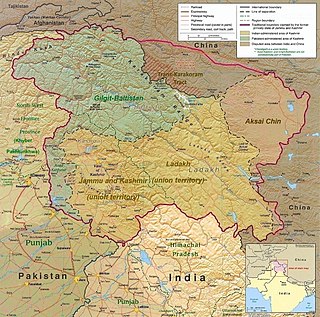
Baltistan also known as Baltiyul or Little Tibet, is a mountainous region in the Pakistani-administered territory of Gilgit-Baltistan and constitutes a northern portion of the larger Kashmir region that has been the subject of a dispute between India and Pakistan since 1947. It is located near the Karakoram and borders Gilgit to the west, China's Xinjiang to the north, Indian-administered Ladakh to the southeast, and the Indian-administered Kashmir Valley to the southwest. The average altitude of the region is over 3,350 metres (10,990 ft). Baltistan is largely administered under the Baltistan Division.

Balawaristan, is a term used for the historical region forming present-day Gilgit-Baltistan .The modern term was coined by the political party Balawaristan National Front, founded by Nawaz Khan Naji, in 1989. But it has its roots in the historical names Broshal, Dardistan and Bolor or Boloristan, with documented usage in Chinese sources from the 8th century AD. According to the present day activists, 'Balawaristan' includes Chitral, Gilgit, Skardu, Hunza, Nagar, Ishkoman, Punial and Yasin. The leader of BNF Nawaz Khan Naji declared that Balawaristan (Gilgit-Baltistan) is not part of Kashmir

Gilgit-Baltistan, formerly known as the Northern Areas, is a region administered by Pakistan as an administrative territory and consists of the northern portion of the larger Kashmir region, which has been the subject of a dispute between India and Pakistan since 1947 and between India and China since 1959. It borders Azad Kashmir to the south, the province of Khyber Pakhtunkhwa to the west, the Wakhan Corridor of Afghanistan to the north, the Xinjiang region of China to the east and northeast, and the Indian-administered union territories of Jammu and Kashmir and Ladakh to the southeast.

The Balawaristan National Front is a defunct political party which sought Independence for Gilgit-Baltistan, claimed as Balawaristan, as well as claims in certain regions of the Indian-Administered Kashmir, Kargil and Ladakh, as part of its historical territory.
The governor of Gilgit Baltistan is the appointed head of state of the provincial government in Gilgit-Baltistan, Pakistan. The governor is designated by the prime minister of Pakistan and is normally regarded a ceremonial post. However, throughout the history of Pakistan, the powers of the provincial governors were vastly increased, every time the provincial assemblies were dissolved and the administrative role came under direct control of the governors.
Gilgit-Baltistan is an administrative territory of Pakistan that borders the province of Khyber Pakhtunkhwa to the west, Azad Kashmir to the southwest, Wakhan Corridor of Afghanistan to the northwest, the Xinjiang Uyghur Autonomous Region of China to the north, and the Indian-administered region of Jammu and Kashmir to the south and south-east.
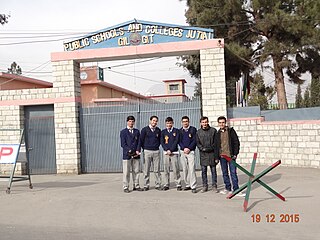
Since its independence in 1947, governments have not spent much on quality education in this region. While the literacy rates of the areas in Gilgit is higher than most of the citites in Pakistan, yet no professional universities were constructed in the region. In 2002, under the reign of Pervez Musharraf, a general university of the name of Karakoram International University was constructed. Various primary schools were constructed by NGO's from around the world including the Aga Khan Development Network.
The chief minister of Gilgit Baltistan is elected by the Gilgit Baltistan Assembly to serve as the head of the provincial government in Gilgit-Baltistan for a five-year term.
The Government of Gilgit-Baltistan is the government of the administrative territory of Gilgit-Baltistan, Pakistan. Its powers and structure are set out in the 2009 Gilgit-Baltistan Empowerment and Self-Governance Order, in which 14 districts come under its authority and jurisdiction. The government includes the cabinet, selected from members the Gilgit–Baltistan Assembly, and the non-political civil staff within each department. The province is governed by a unicameral legislature with the head of government known as the Chief Minister. The Chief Minister, invariably the leader of a political party represented in the Assembly, selects members of the Cabinet. The Chief Minister and Cabinet are thus responsible the functioning of government and are entitled to remain in office so long as it maintains the confidence of the elected Assembly. The head of state of the province is known as the Governor. The terms Government of Gilgit–Baltistan or Gilgit–Baltistan Government are often used in official documents. The seat of government is in Gilgit, thus serving as the capital of the territory.
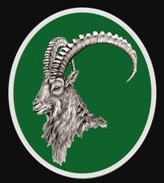
The Gilgit−Baltistan Scouts, are a federal paramilitary force in Pakistan, tasked with law enforcement in the nominally autonomous territory of Gilgit-Baltistan and border guard duties. The force was formed in 2003 under the control of the Interior Ministry of Pakistan, but it claims a tradition dating back to the Gilgit Scouts formed during the British Raj era. However, the earlier Scouts unit is now a full infantry regiment of the Pakistan Army (see Northern Light Infantry Regiment, which mostly operates in the same region as the current Scouts.

Elections were held on 12 November 2009 in the province of Gilgit-Baltistan for the first time to elect the first Assembly of Gilgit-Baltistan.

The 2015 Gilgit-Baltistan Assembly elections were held on 8 June 2015. Elections were held in 24 constituencies, each electing one member to the 2nd Gilgit-Baltistan Legislative Assembly. 269 candidates contested these elections, either representing one of the political parties of Gilgit-Baltistan or being an independent candidate.
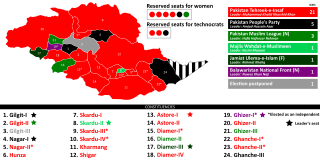
The 2020 Gilgit-Baltistan Assembly elections were held on 15 November 2020. Elections were held in 24 constituencies, each electing one member to the 3rd Gilgit-Baltistan Legislative Assembly. 330 candidates contested these elections, either representing one of the political parties of Gilgit-Baltistan or being an independent candidate.
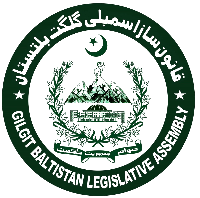
The Gilgit-Baltistan Assembly (GBA), officially known as Gilgit-Baltistan Legislative Assembly (GBLA), is a unicameral legislature of elected representatives of the Pakistani territory of Gilgit-Baltistan, which is located in Jutial neighbourhood in the city of Gilgit, the capital of Gilgit-Baltistan. It was established under the Gilgit-Baltistan Empowerment and Self-Governance Order in 2009 which granted the region self-rule and an elected legislature, having a total of 33 seats, with 24 general seats, 6 seats reserved for women and 3 reserved for Technocrats and Professionals.
Muhammad Khalid Khurshid Khan is a politician who served as the President of Pakistan Tehreek-e-Insaf Gilgit-Baltistan from May 2022 to December 2023 and as the Chief Minister of Gilgit-Baltistan, a territory in Northern Pakistan until he was disqualified from his post on 4 July 2023 by the Gilgit-Baltistan Chief Court. He was also a member of the Gilgit Baltistan Assembly from 25 November 2020 until his disqualification.
The Supreme Appellate Court Gilgit-Baltistan is the highest court of appeal in the region of Gilgit Baltistan, Pakistan. It consists of a chief justice and two other judges. The court was established in 2009 under Gilgit-Baltistan 2009 and has the similar jurisdiction equal to the Supreme Court of Pakistan. The Permanent Seat of the Court is at Gilgit, but the court also sits from time to time at Skardu Branch Registry.
The Gilgit-Baltistan Chief Court is the court of appeals in the region of Gilgit-Baltistan, Pakistan. The decisions of the court are appealed to Supreme Appellate Court Gilgit-Baltistan. The court acts under 2009 Gilgit-Baltistan Empowerment and Self-Governance Order and has the equal status as of other high courts of Pakistan. The Permanent Seat of the Court is at Gilgit, but the Court also sits from time to time at Skardu Branch Registry.
The Election Commission Gilgit-Baltistan is an independent, autonomous, permanent and constitutionally established body responsible for organizing and conducting elections to the Gilgit-Baltistan Legislative Assembly and local governments, Gilgit-Baltistan Council, as well as the delimitation of constituencies and preparation of electoral rolls.













